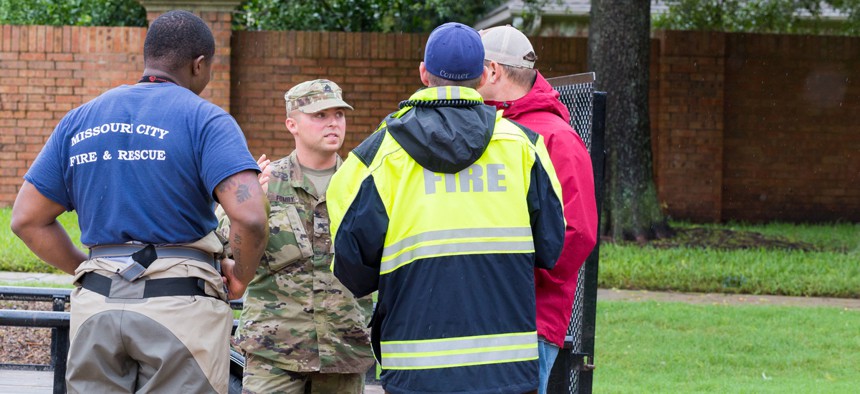FirstNet to Offer Emergency Drop Kits Creating a ‘Connected Bubble’ to First Responders

Texas National Guard and first responders working together to assist with emergency operations. Heavy rains from hurricane Harvey caused many floods near Houston Aug. 29, 2017. michelmond/Shutterstock.com
AT&T’s team is also working with states to get a liaison in every emergency operations center.
AT&T’s FirstNet team plans to meet with emergency operations officials in every state to customize a new program announced Monday to equip first responders with deployable network assets, including portable kits providing constant communications within a 300-foot radius.
The First Responder Network Authority selected the telecom giant to deploy and operate the first high-speed nationwide wireless broadband network dedicated to public safety, dubbed FirstNet, in March 2017.
Emergency drop kits—a collaboration with ruggedized cell phone manufacturer Sonim—are designed to create a “connected bubble” around first responders when natural disasters like wildfires and hurricanes down communications. First responders will also be able to use the kits during emergencies in rural or remote areas.
“The kits will make it even easier for first responders to stay connected to the full capabilities of their network—no matter where their mission takes them,” said Chris Sambar, senior vice president of AT&T-FirstNet, in a statement.
Kits will serve as an interim solution for rapidly connecting to FirstNet, until AT&T builds out the network. When a cell truck can’t be dispatched, a forward-deploying strike team can carry the network with them where vehicles can’t go, Ryan Fields-Spack, director of public safety strategies for FirstNet, told Route Fifty.
A router with a FirstNet-ready modem and Wi-Fi will act as a secure data communications hub for four Sonim mobile phones—preloaded with an Intrepid Response app that will show the user’s GPS location in the field. All of that fits into a 25-pound Pelican case, along with the power supply.
FirstNet customers can expect the kits available for purchase in the online portal within the next six months, Fields-Spack said. All 50 U.S. states, both territories and Washington, D.C. signed up for FirstNet.
The AT&T FirstNet team will also embed liaisons in every state emergency operations center, or EOC, for situational awareness on how best to use the 70-plus deployable network assets—from truck-mounted satellite towers to trailer-based offerings. Called the Response Operations Program, public safety agencies will control where deployable network assets go.
“It really is the linchpin for how we help out public safety agencies, when there is an event where they might not have adequate coverage,” Fields-Spack said. “Even if the network isn’t involved, we will still activate.”
By meeting with state EOCs, FirstNet can align with their specific resource mobilization processes.
Liaisons are also expected to support state EOCs 24/7 during incidents, as well as join county and municipal centers where appropriate. For instance, Texas City, Texas police received a deployable network asset within hours of requesting one.
“With FirstNet, we are finally seeing a network that understands and answers to our needs—no strings attached,” said Robert Turner, systems administrator for Texas City, in a statement. “This type of commitment is exactly what the public safety community is looking for.”






